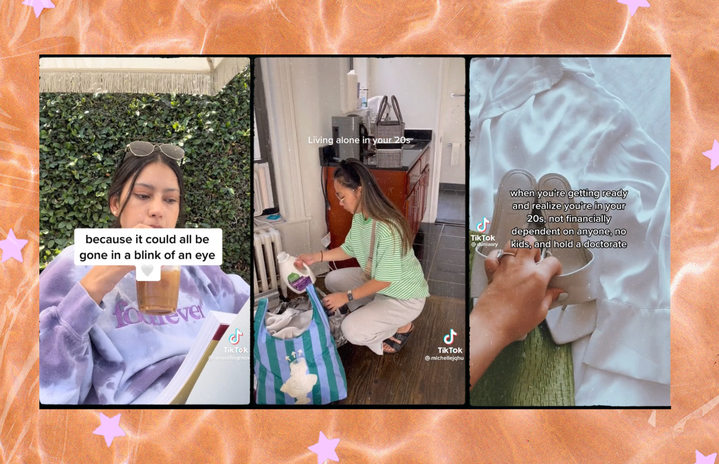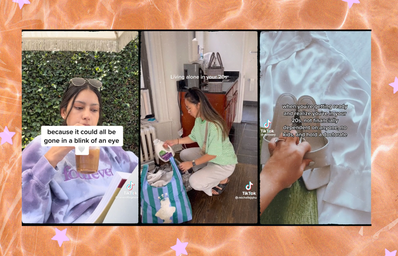So, you’ve graduated college or just moved out of your hometown, you’re in your 20s, and now it’s the time to find yourself — well, only according to the perfectly curated videos on TikTok. Social media creators love to make aesthetic videos on parts of their lives, and this even includes aesthetic videos that have become part of the “finding yourself” in your 20s TikTok trend. “Aesthetic” means beauty, but if this term is attached to the time in your life where you are supposedly learning and growing, then the “beauty” of it, as seen in the videos on social media, seems almost unattainable.
Many of these videos come with good intentions and want to harp on the positives of being in your 20s, such as this TikTok video that focuses on the freedom of being in your 20s or this one that celebrates being financially independent. However, what unites them as a phenomenon is that they leave out the further implications of freedom or financial independence, showing a one-sided perspective that can build up unrealistic expectations for those entering their 20s.
Your 20s is a time of freedom and growth, which isn’t always graceful or seamless. Sure, the aesthetic videos of “finding yourself” are a highlight reel of the positive parts of this time in your life, such as living alone or doing things that make you happy. However, that’s all it is — a highlight reel. They fail to show the hard parts of living alone or navigating this newfound freedom. Your 20s are a time to find yourself, but if the depiction of it on social media is carefully crafted, finding yourself can feel like a goal that is out of reach, which can do more harm than good.
These perfectly curated videos spark comparison, which impacts how we perceive ourselves.
According to Very Well Mind, there are two types of social comparison that users encounter on social media: upward and downward. Upward implies looking at someone better off than you to feel inspired or hopeful. However, this can have an adverse effect on your mental health. Mikela Hallmark, a licensed professional counselor, tells Her Campus, “Watching social media can be motivating, but it can also backfire and cause us to suffer from extreme forms of comparison. And, the danger of comparison is that it can negatively impact self-esteem.”
These aesthetic videos of finding yourself in your 20s create a one-size-fits-all narrative that adds to the social pressure that already exists. These videos might cause you to try and fit into a box, but while doing so, you forget to separate yourself from the person in the video. The picture that is painted isn’t the whole picture, but it’s easy to compare the glamorous life depicted to your own life, which impacts your self-esteem and self-doubt.
Hallmark continues, “When we watch other people post pretty pictures or well-produced videos of their lives, how they’ve found themselves, their adventures, we can subconsciously struggle to recognize that we’re getting small snippets from their lives rather than the whole picture. And, we can take in the messages we’re receiving, without the full version of what it means to be 20 and ‘trying to find’ yourself.”
These videos often show a depiction of an ideal life for those in their 20s or who are post-grad: a life where your career is set in place and is seamless. This can cause self-doubt and frustration for social media users who consume these videos because they feel that they aren’t enough or aren’t on the right path. In fact, according to a 2021 study published in Frontiers In Psychology, career frustration increased due to social media consumption because of social comparison. This was evoked by the feeling of inferiority or lack of confidence in themselves.
Lily, 22, has noticed this phenomenon in her own life. She tells Her Campus, “I didn’t get a job right after I graduated, which, based on social media, seems like everyone did. I found myself doing something I love elsewhere and was excited for it, but couldn’t help but think about what others were doing and how maybe I should be settling down in a new city with a new job and a new apartment like them.”
FOMO is real, especially when social media makes you feel like you’re on the wrong path.
FOMO, or the fear of missing out, is an anxiety that comes from a feeling that others are having more fun or living better lives than you. FOMO is exacerbated by the use of social media because there is a continuous awareness and exposure of what you might be missing out on, which in this case, is a fear of missing out in your 20s.
Victoria, 21, tells Her Campus, “Being in a relationship in my 20s, vídeos that say being single at this age is the best decision you can make and that you’ll regret not living for yourself during this time are really harmful to me. I never question my love for my significant other, but it makes me second guess whether I’m ‘doing it right.’”
Beyond relationships, these videos might paint an unrealistic picture on a financial standpoint, causing FOMO when it comes to life experiences. Some of these creators that are producing this aesthetic content come from a certain socioeconomic class that isn’t attainable for everyone who is freshly in their 20s. There are many financial obstacles in your 20s, such as rent, bills, student loan debt, entry-level pay, and more. Victoria continues, “Many of these videos depict traveling to exotic locations with friends and that’s financially unrealistic for a lot of people. I work two jobs and would never have the time to drop everything to go on extravagant vacations (with the exception of study abroad).”
Whether it be traveling or being single to focus on yourself, these aesthetic videos add pressure that might cause you to feel like you’re missing out on “greater” things in life that differ from the path you’re on. However, the path to finding yourself might require different steps in the road that aren’t portrayed in routine videos or traveling vlogs.
“Finding yourself” is a subjective experience and can’t be summed up in a 60-second video.
The reality is, “finding yourself” has no one concrete definition or process. It’s up for interpretation based on your personal goals and where you are at in your life. But, there is one common denominator: finding yourself relies on your inner purpose and being aware of your thoughts and feelings whether that be in your career, life, or relationships.
Hallmark explains, “From a more existential perspective, aren’t we constantly ‘finding ourselves?’ The truth is, we are. What you know about yourself, about life, about the world will be different at 20, 30, 40, and 50. But, we struggle to really grasp this when we’re watching tiny clips of people showing that they’ve arrived to really finding themselves in their 20s, and if we’re not careful, we’ll expect the same thing from ourselves.”
What these perfect videos of traveling and seamless “days-in-the-lives” fail to show are the bumps in the road that led to the growth of “finding yourself.” Growth comes in many forms and from different starting points for everyone.
Basiliki, 23, tells Her Campus, “‘Finding yourself’ in your 20s is something you struggle with continuously. From my perspective, no one finds themselves at this age or never to be honest. Took me a while to understand that everybody has their own path and is different. Life isn’t linear and is full of ups and downs but that’s what is all about, the pretty and the bad moments. Finding yourself is not something you stop doing after a certain age, it’s an everyday ‘task.’ As humans, we never stop learning things about ourselves and that’s the beauty in it.”
If finding yourself was a tangible goal like these videos makes it out to be, then your 20s, or 30s, or even 40s would be a lot simpler. However, that isn’t the case. Finding yourself is an intrinsic goal that requires you to evaluate your individual needs, which might not be accounted for in these aesthetic videos. Hallmark advises using mindfulness while perusing social media. Ask yourself if these videos are helping or harming you, and if it’s the latter, try finding creators who show “both sides” of life.


